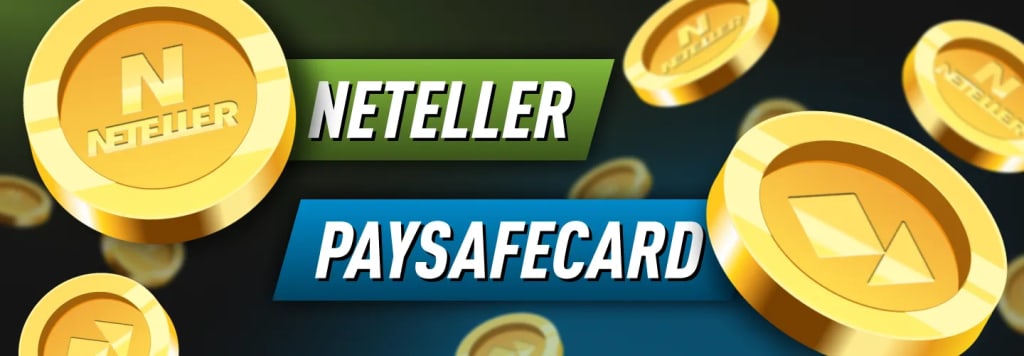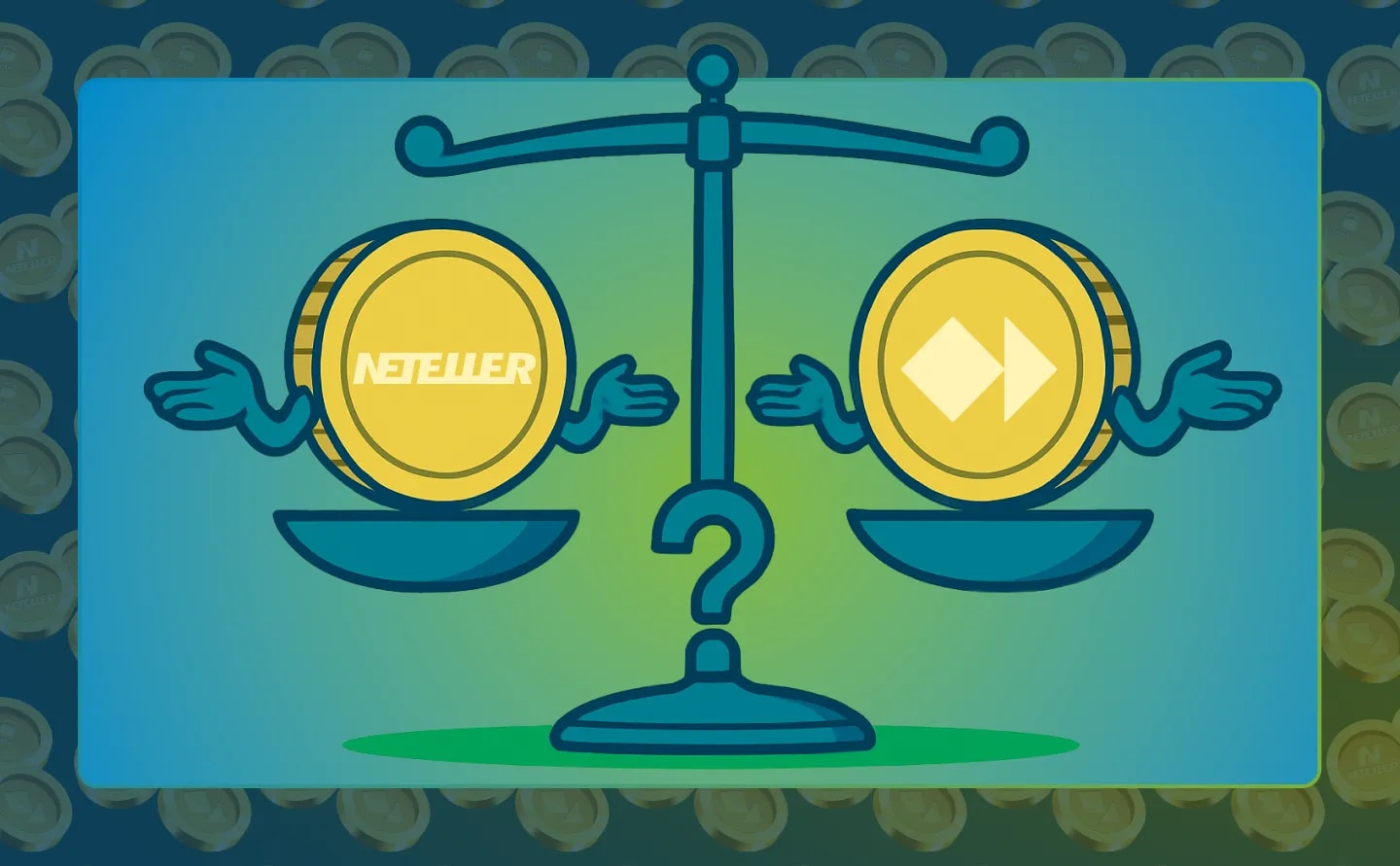Neteller & PaysafeCard

Neteller & PaysafeCard: Should You Use A Digital Wallet Or A Prepaid Voucher In 2025?
Over the past few years, the world has been moving increasingly towards a more cashless direction. Simultaneously, traditional banks have been left behind, as many of them are unable to keep up with the demands of the new, digitalized finance world.
These days, more and more people are seeking greater financial flexibility than banks can offer: freelancers working globally and across borders, gamers depositing and withdrawing from online gambling sites, or simply ordinary individuals who want to hold both traditional fiat currencies and cryptocurrencies on the same account.
Digital wallet providers answered their needs, many of them continuously upgrading and expanding their services to the point that e-wallets can be considered modern finance’s Swiss Army knives.
At the forefront of the pack stands Paysafe Limited, the multinational online payments company responsible for three market-leading digital wallets: Skrill, Neteller, and PaysafeCard.
In this comprehensive guide, we will observe the latter two in detail. What are their pros and cons? How do they work? What are they good for? Are they good for poker and other gambling sites? How do they measure up to their competitors? And above all, the most important question: which is the best choice for you?
If you are completely new to modern fintech services, don’t worry – by the end of our article, you will know exactly which service aligns best with your financial needs.
Neteller: A Pioneer in Gambling Payments
Launched in the midst of the dot-com bubble in 1999, Neteller is one of the first dedicated e-wallets, designed exclusively for digital transactions, predating by a year even PayPal, the company that dominated the fintech scene for a long time.
Neteller’s services were adapted early on by online gambling sites, including the booming online poker market, making it a pioneer of digital payments. Even after PayPal’s launch, the company was able to retain its market share because it mostly operated in the gambling niche, while PayPal targeted a broader e-commerce customer base.

In 2015, financial giant Paysafe Group acquired Neteller in a landmark $1.1 billion deal. Following the acquisition, Neteller has evolved into a quite comprehensive fintech platform, supporting more than 40 currencies and serving millions of customers in more than 200 countries.
Key Features
Before diving into the details, here is a quick overview of Neteller’s most important features:
| Feature | Why It Matters |
|---|---|
| Global money transfers | Send funds internationally with competitive FX rates |
| Net+ prepaid Mastercard | Spend your balance anywhere Mastercard is accepted |
| Cryptocurrency support | Buy and sell major cryptocurrencies directly in-app |
| Merchant payments | Accepted by thousands of online businesses worldwide |
| Instant transactions | Near real-time transfers between Neteller accounts |
How Does it Work: A Step-by-Step Breakdown
1. Easy Sign-Up
Creating a Neteller account is simple and takes about two to five minutes. To register, you need to select your desired base currency, provide an email address, and submit the required KYC (know your customer) documents: your ID and proof of address.
2. Funding Your Wallet
You can transfer money to your Neteller account in multiple ways:
- via bank transfer (free, but slower, can take up to 3 business days)
- via credit or debit card payment (processed instantly, but has a 2.5%-5.99% fee)
- via cryptocurrency deposit (varies by crypto)
3. Sending & Receiving Money
One of Neteller’s strengths is its peer-to-peer (P2P) transfers. Paying freelancers or splitting a restaurant bill with friends? Regardless of the amount, P2P transactions on Neteller are processed almost instantly.
Transaction fees vary by transfer type. Domestic transfers are usually free, international transfers have a forex fee from 1.45 percent to 3.99 percent, and some retailers might charge extra if you choose to settle merchant payments with Neteller.
Here is a detailed breakdown of each transfer type with its fees and what kind of transactions we recommend them for:
| Transfer Type | Best For | Processing Time | Fees |
|---|---|---|---|
| Neteller-to-Nteller (Same Currency) | Paying friends, freelancers, etc. | Instant | Free |
| Neteller-to-Neteller (Currency Conversion) | Cross-border payments | Instant | 1.45%-3.99% FX fee |
| Neteller-to-Bank | Large withdrawals | 1-3 days | $10-$30 fee |
| Neteller-to-Merchant (Online Stores) | Gambling, gaming, subscriptions | Instant | Free (but some merchants add surcharge) |
Neteller Crypto
Buying and selling cryptocurrencies is also a feature of Neteller, but with an important restriction: crypto transactions must stay within Neteller.

This means that you cannot send crypto to an external wallet like Ledger, and conversely, you cannot receive crypto from other wallets into Neteller either.
Here is a detailed look at Neteller’s cryptocurrency transaction fees:
| Transaction Type | Fee |
|---|---|
| Buying Crypto | 1.5% – 2.5% (varies by crypto) |
| Selling Crypto | 1.5% – 2.5% |
| Exchange Rate Spread | ~1-3% (hidden fee in rates) |
VIP Rewards: Perks for Power Users
If you execute transactions worth at least $5,000 in 30 days, you will automatically become a VIP member.
This can be done by any combination of deposits, money transfers, or crypto buys. It is usually gamblers and crypto traders who reach the VIP level the fastest.
To keep your VIP status, you need to maintain the €5,000 monthly transaction volume. If you drop below that volume, your account will be downgraded to ‘Classic’ from the following month.
Neteller rewards frequent users through a tiered VIP system:
| VIP Level | Requirements | Benefits |
|---|---|---|
| Classic | $0 monthly volume | Standard fees apply |
| Silver | $5,000 monthly volume | 10% fee discount |
| Gold | $25,000 monthly volume | 20% fee discount + dedicated account manager |
| Diamond | $100,000 monthly volume | 40% fee discount + priority support |
VIP members also have higher transaction limits and exclusive cashback offers at partner merchants, but VIP rewards are not as diverse as those at Skrill.
Is Neteller Safe? Security & Trustworthiness
Neteller is a legit service, licensed by the FCA in the United Kingdom and the MFSA in Malta. The company is also registered with FINTRAC in Canada. As a result, the company complies with strict financial regulations.

Neteller employs mandatory two-factor authentication and utilizes a military-grade 256-bit encryption to ensure security, while also monitoring for fraud to protect its users. Customer funds are also held in segregated client accounts, which means that your money is protected even in the event that Neteller might face financial issues.
PaysafeCard: The Anonymous Prepaid Voucher
Launched in 2000 by Austrian entrepreneur Michael Müller, PaysafeCard was initially a response to growing concerns about credit card fraud and digital privacy.
PaySafeCard was the first to introduce a prepaid online voucher in Europe, allowing its customers to make purchases without sharing any financial details.
The simple cash alternative company was acquired by Skrill Group (later known as Paysafe Group) in 2009 for €140 million. PaysafeCard currently processes billions of transactions every year in more than 50 countries.

Key Features
Before diving into the details, here is a quick overview of Neteller’s most important features:
| Feature | Why It Matters |
|---|---|
| Truly anonymous | No bank account or personal details needed to use |
| Cash-Based | Purchase vouchers at 650,000+ retail locations worldwide |
| Budget Control | Prepaid nature prevents overspending |
| Gambling-Friendly | Accepted by many poker and casino sites, including Natural8 |
How PaysafeCard Works: A Step-by-Step Breakdown
1. Purchase A Voucher
You can purchase physical PaysafeCard vouchers at any participating store in the following denominations (might vary by country): €10, €25, €50, and €100. Alternatively, you can buy digital PaysafeCard PINs online, but for these, higher fees apply.
2. Redeem Your Voucher
When you purchase something, select ‘PaysafeCard’ as payment method at checkout, then enter the 16-digit PIN, and the amount is automatically deducted from your voucher’s balance.
3. Manage Your Balance
You can also combine multiple vouchers into one account on MyPaysafe and check the remaining balance online. Vouchers have no expiration in EU countries, but it is important to note that, unlike Skrill or Neteller, PaysafeCard does not offer P2P transactions; it is strictly a prepaid spending service.
MyPaysafe Features
Unlike Skrill or Neteller, PaysafeCard does not offer a traditional tiered VIP program, but it does offer exclusive perks for users who register a MyPaysafe account.
To register a MyPaysafe account, you only need an email address or phone number; no bank details or KYC identification are required.
With a MyPaysafe account, you get a higher spending limit up to €2,500 per month compared to €1,000 per month for guests. Your transaction history also becomes available, so you can track all your payments in one place. You also get balance protection to recover lost PINs. Some partner merchants might even offer exclusive discounts for MyPaysafe users.
Is PaysafeCard Safe? Security & Trustworthiness
PaysafeCard complies with Payment Card Industry Data Security Standards (PCI-DSS), which provides the same level of security as major bank and payment processors use. All PaysafeCard transactions are encrypted.
Every voucher comes with a 16-digit secure PIN code. The PIN is required for every purchase as an extra layer of security.
PaysafeCard is a prepaid service; you can only spend what is on the card, and it has no hidden fees and does not allow auto-renewing or recurring charges. Once the voucher’s balance goes down to zero, no further transactions can be made using that voucher.
Unlike credit cards and many digital wallets, PaysafeCard does not require any KYC identification, not even your full name, so transactions are completely anonymous.

Competitor Analysis: Neteller vs. PaysafeCard vs. The Rest
| Feature | Neteller | PaysafeCard | Skrill | PayPal | Revolut |
|---|---|---|---|---|---|
| Account Needed | Yes | No | Yes | Yes | Yes |
| Anonymity | Low | High | Medium | Low | Low |
| Funding Methods | Bank, Card, Crypto | Cash Only | Bank, Card | Bank, Card | Bank, Card |
| Fees | Medium-High | Low | High | Medium | Low |
| Prepaid Card | Yes | No | Yes | Yes | Yes |
| Crypto Support | Yes | No | Yes | Limited | Yes |
| VIP Program | Yes | No | Yes | No | No |
| Best For | Trading, Gambling | Gambling, Privacy | Gambling | General Use | Travel, Crypto |
Based on our comparison, the best digital wallets for gambling purposes are Skrill and Neteller. Interestingly, both services are owned by the same company.
Conclusion: Which One is Best for You?
Really, the choice between Neteller and PaysafeCard should be made with your specific needs in mind.
If you need a digital wallet with plenty of features, perhaps because you make international transactions frequently or want cryptocurrency support, go with Neteller. Keep in mind, though, that you will need to verify your identity to access all features.
If complete anonymity is important to you, or you just prefer cash-based transactions, or perhaps want to strictly control your spending, choose PaysafeCard. In this case, keep in mind that your voucher is primarily usable for gambling and gaming, or for buying digital content.
Of course, you can use both services for maximum flexibility: PaysafeCard for anonymous purchases and Neteller for the rest of your financial needs.
Claim the Best Poker and Casino Bonuses!
Unlock exclusive online poker bonus codes!
Get the best casino promo codes and play at trusted Paysafecard casinos or Neteller casinos!



















